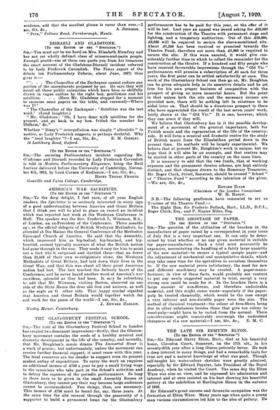THE GLASTONBURY FESTIVAL SCHOOL.
[To THE EDITOR OF THE "SPECTATOR."]
Sia,—The visit of the Glastonbury Festival School to London has created two dominant impressions—firstly, that the Glaston- bury movement contains the seeds of a healthy musical and dramatic development in the life of the country, and secondly, that Mr. Boughton's music drama The Immortal Hour is a work of genius; but unfortunately, unless the movement can receive further financial support, it must cease with this year. The local resources are too slender to support even its present modest outlay of expenditure. To carry the work on requires an additional income of £750 a year to pay a small living wage to the musicians who take part in the School's activities and to defray the expenses of the periodic performances. So long as these have to be given in the small Assembly Rooms at Glastonbury, they cannot pay their way because large audiences cannot be accommodated. Two things, then, are necessary. This income of £750 must be found for, say, three years. At the same time the site secured through the generosity of a supporter to build a permanent home for the Glastonbury performances has to be paid for this year, or ehe offer of it will be lost. Last year an appeal was issued asking for £10,009 for the construction of the Theatre with permanent stage and lighting, and a temporary auditorium. Out of this £10,000, £3,000 will be required to secure the above-mentioned site. About 41,200 has been received or promised towards the Theatre Fund, therefore not more than £1,800 is required to secure the site. If this were assured, it would give con- siderably further time in which to collect the remainder for the construction of the theatre. If a hundred and fifty people who have received favourable impressions through the "Old Vie" performances will promise a subscription of .R.5 each for three years, the first point can be settled satisfactorily at once. The work of the Glastonbury School can then go on, Mr. Boughton can be given adequate help in its executive details and be set free for his own proper business of composition with the prospect of giving us more immortal hours. But the point is that unless both the site and the necessary income are provided now, there will be nothing left in existence to be aided later on. That should be a disastrous prospect to those who have appreciated the result of the last seven years' work, lately shown at the "Old Vic." It is one, however, which they can avert if they will.
We believe that Glastonbury has in it the possible develop- ment of a movement of the greatest importance, both for Pritish music and the regeneration of the life of the country- side. It will form a musical and dramatic centre for the study of British music from the Elizabethan period down to the present time. Its methods will be largely experimental. We believe that at present Mr. Boughton's work is unique, but we hope that it will also be an example, and that centres may be started in other parts of the country on the same lines.
It is necessary to add that the two funds, that of working expenses and the permanent theatre scheme, are kept entirely distinct, and that cheques drawn to the Honorary Treasurer, Mr. Roger Clark, Street, Somerset, should be crossed " School " or "Theatre Fund" according to the intention of the giver. —We are, Sir, &c.,
EDWARD ELCAR
(Chairman of the London Committee). W. H. HADOW.
N.B.—The following gentlemen have consented to act as Trustees of the Theatre Fund :— The Right Hon. Sir Frederic Pollock. Bart., LL.D., D.C.L., Roger Clark, Esq., and P. Napier Miles, Esq.


































 Previous page
Previous page